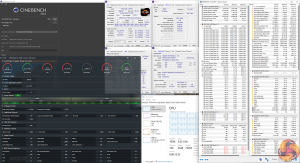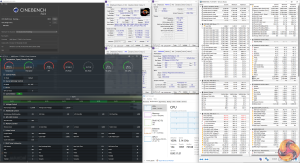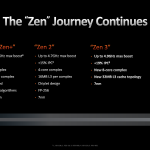Ryzen 9 7950X clocks
Looking at clock speeds for the Ryzen 9 7950X, we noted an average all-core speed of just over 5GHz after a 10-minute looped run of Cinebench R23. This is split as around 5.1GHz on CCD0 and 4.97GHz on CCD1. Cinebench 1T saw a single thread peak at 5.7GHz under our observation.
Over 5GHz average for a 16-core AMD processor out-of-the-box is phenomenal. Clearly, TSMC’s 5nm process node is delivering. Well, 5nm plus copious amounts of power delivery.
To get this 5GHz level during all-core loading, we saw package power delivery operating at 215W. In fact, the only reason it wasn’t jammed closer to 230W is because our 25C room ambient meant that the chip was hitting its 95-degree Celsius threshold even with a 360mm AIO liquid cooler.
That’s some serious power draw and some serious heat. This had better translate into high levels of computational performance.
Ryzen 7 7700X Clocks
The Ryzen 7 7700X runs a little quicker by virtue of its lower core count, single CCD, and therefore greater power allocation per core. Here, we observed a Cinebench nT all-core frequency of just under 5.2GHz after 10 minutes of runtime. And 1T peaked at 5.55GHz for us.
You’d be forgiven for thinking that half the cores running at a similar speed would translate into lower power draw and temperatures. But only one of those assumptions is correct.
With the 7700X drawing just shy of 140W of package power in our testing, we still saw the temperature hitting 95C out-of-the-box with a 360mm AIO. In fact, the 95C temperature threshold being reached once again clipped the power delivery to AMD’s Zen 4 chip.
Of course, AMD’s Precision Boost 2 algorithm is just as smart as ever. So, it’s clear that the formula is for the chips to push up frequency until reaching 95C and then back off the power and subsequent frequency to maintain that temperature threshold.
And in that sense, AMD’s boost algorithm is efficient at aiming to squeeze out all of the performance from the processor… if you’re happy to see 95C, of course.
 KitGuru KitGuru.net – Tech News | Hardware News | Hardware Reviews | IOS | Mobile | Gaming | Graphics Cards
KitGuru KitGuru.net – Tech News | Hardware News | Hardware Reviews | IOS | Mobile | Gaming | Graphics Cards





